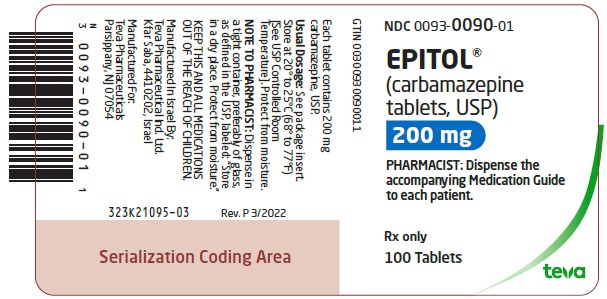Epitol | Carbamazepine Tablet while Breastfeeding

What is Epitol | Carbamazepine Tablet used for?
I am breastfeeding mother and I am using Epitol | Carbamazepine Tablet. Can it have any bad effect on my kid? Shall I search for better alternative?

Nursing Mothers Carbamazepine and its epoxide metabolite are transferred to breast milk. The ratio of the concentration in breast milk to that in maternal plasma is about 0.4 for carbamazepine and about 0.5 for the epoxide. The estimated doses given to the newborn during breastfeeding are in the range of 2 to 5 mg daily for carbamazepine and 1 to 2 mg daily for the epoxide. Because of the potential for serious adverse reactions in nursing infants from carbamazepine, a decision should be made whether to discontinue nursing or to discontinue the drug, taking into account the importance of the drug to the mother.
Epitol | Carbamazepine Tablet Breastfeeding Analsys
Carbamazepine while Breastfeeding
SafeCAS Number: 298-46-4
Excreted into breast milk in moderate amount that could arrive to be significant. Most infants reported were not found of suffering clinical issues at short or long term. However, serum levels have reached a low range of therapeutic levels, with isolated cases of somnolence, poor feeding and transient liver dysfunction with associated cholestasis. One case of Deprivation Syndrome has been reported after sudden discontinuation of medication. The American Academy of Pediatrics rates it as usually compatible with Breastfeeding. Eleventh WHO Model List of Essential Drugs 2002: Compatible with breastfeeding.
Epitol | Carbamazepine Tablet Breastfeeding Analsys - 2
Carbamazepine while Breastfeeding
CAS Number: 298-46-4

Breastfeeding during carbamazepine monotherapy does not appear to adversely affect infant growth or development, and breastfed infants had higher IQs and enhanced verbal abilities than nonbreastfed infants at 6 years of age in one study.[1] If carbamazepine is required by the mother, it is not necessarily a reason to discontinue breastfeeding. Carbamazepine has relatively high levels in breastmilk and breastfed infants have serum levels that are measurable, but usually below the anticonvulsant therapeutic range. Most infants have had no adverse reactions, but sedation, poor sucking, withdrawal reactions and 3 cases of hepatic dysfunction have been reported. These have all been complicated because of intrauterine exposure and, in some cases, concurrent drug therapy. Monitor the infant for jaundice, drowsiness, adequate weight gain, and developmental milestones, especially in younger, exclusively breastfed infants and when using combinations of anticonvulsant or psychotropic drugs. One author recommends monitoring infant serum carbamazepine levels, liver enzymes, and a complete blood count during therapy.[2]
What should I do if already breastfed my kid after using Epitol | Carbamazepine Tablet?
It is always a good idea to keep your healthcare provider or doctor informed about your drug usage during pregnancy and breastfeeding but if you have not informed your doctor about Epitol | Carbamazepine Tablet and have used it then do not panic as Epitol | Carbamazepine Tablet is mostly safe in breastfeeding and should not cause any harm to your baby.
I am nursing mother and my doctor has suggested me to use Epitol | Carbamazepine Tablet, is it safe?
Usage of Epitol | Carbamazepine Tablet is safe for nursing mothers and baby, No worries.
If I am using Epitol | Carbamazepine Tablet, will my baby need extra monitoring?
No
Who can I talk to if I have questions about usage of Epitol | Carbamazepine Tablet in breastfeeding?
US
National Womens Health and Breastfeeding Helpline: 800-994-9662 (TDD 888-220-5446) 9 a.m. and 6 p.m. ET, Monday through Friday
UK
National Breastfeeding Helpline: 0300-100-0212 9.30am to 9.30pm, daily
Association of Breastfeeding Mothers: 0300-330-5453
La Leche League: 0345-120-2918
The Breastfeeding Network supporter line in Bengali and Sylheti: 0300-456-2421
National Childbirth Trust (NCT): 0300-330-0700
Australia
National Breastfeeding Helpline: 1800-686-268 24 hours a day, 7 days a week
Canada
Telehealth Ontario for breastfeeding: 1-866-797-0000 24 hours a day, 7 days a week
